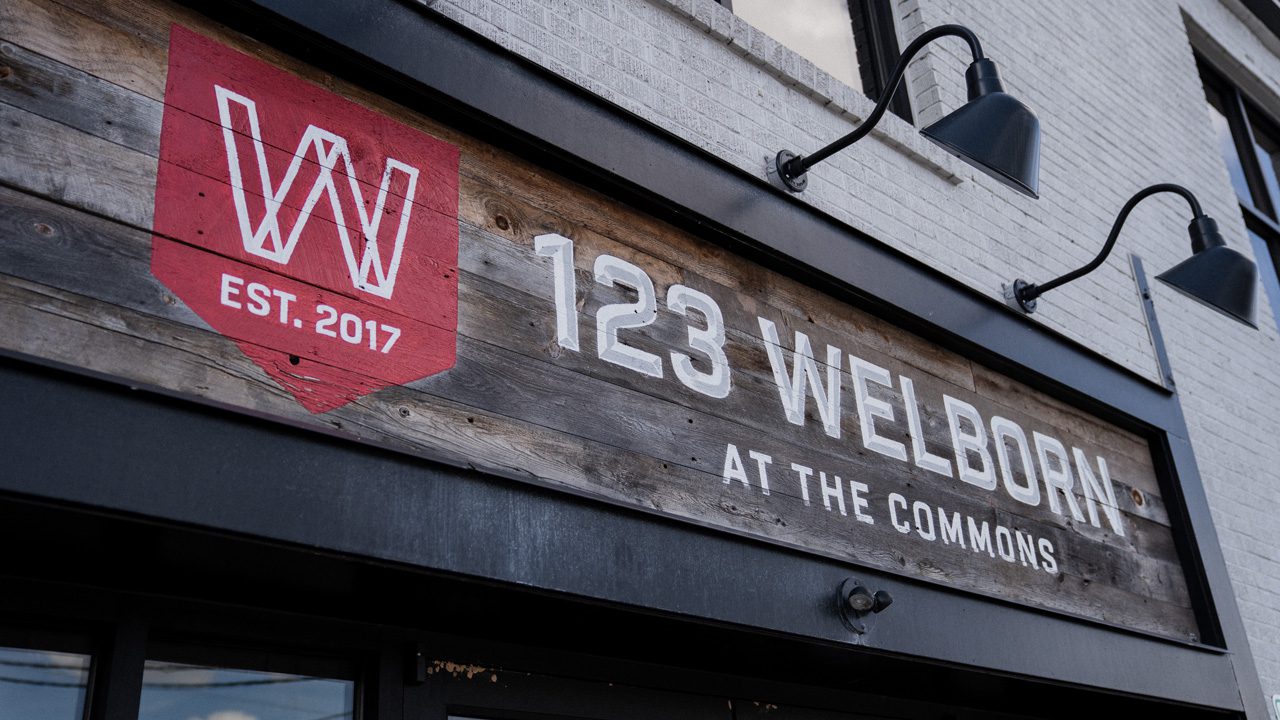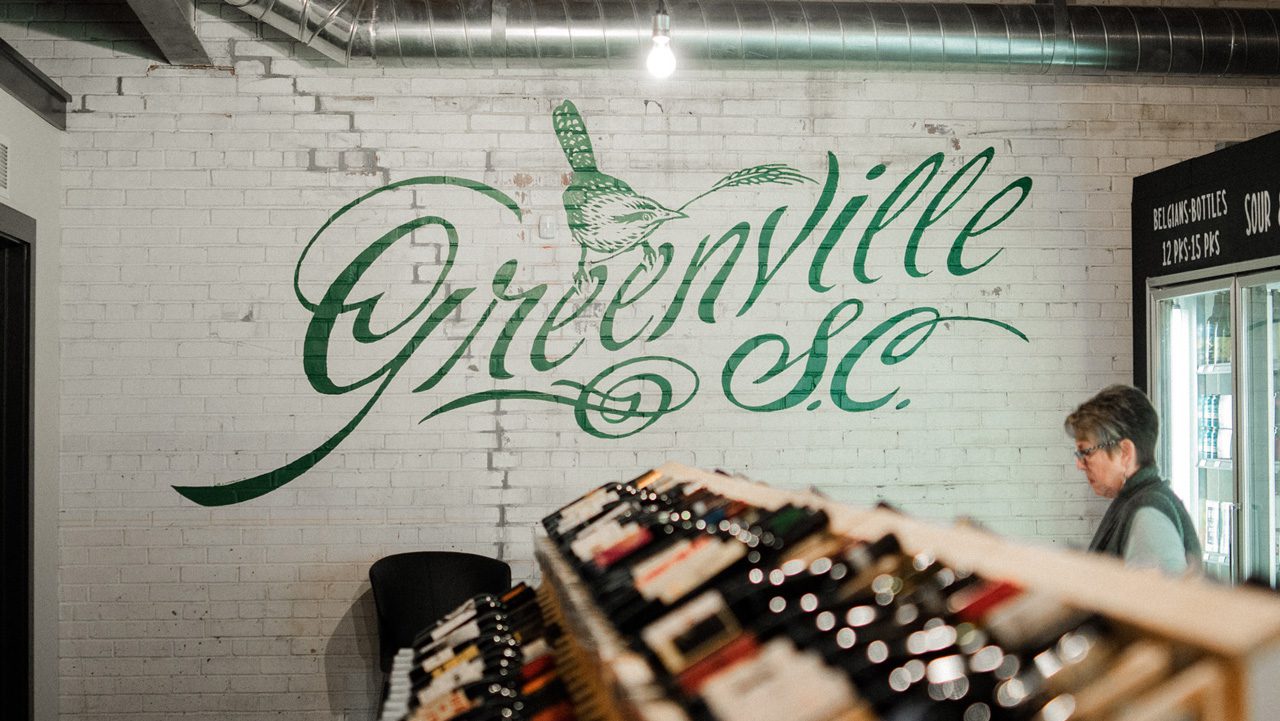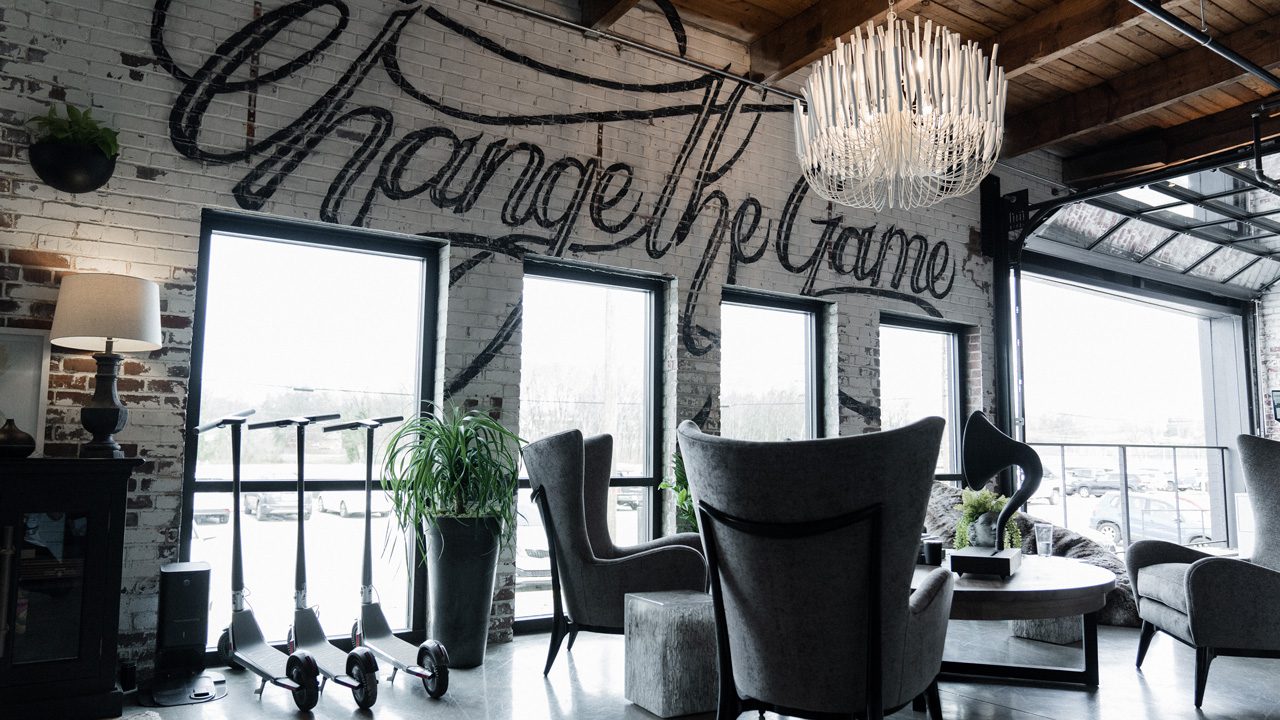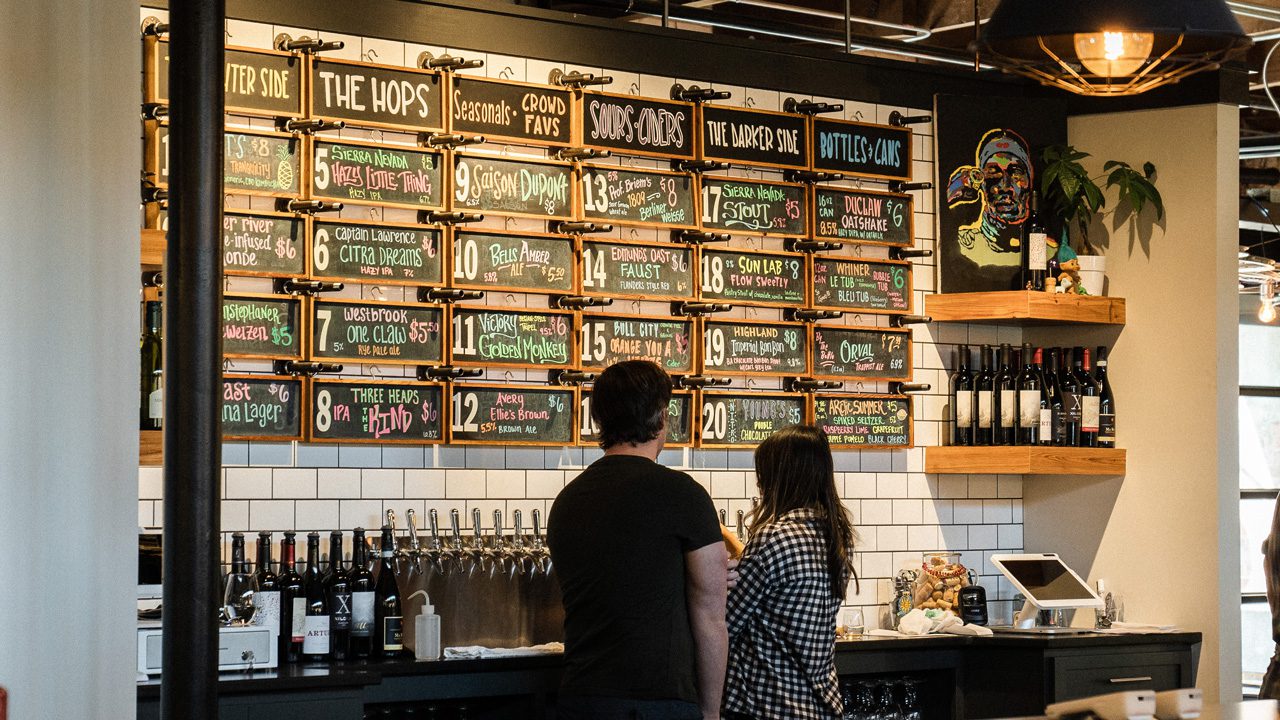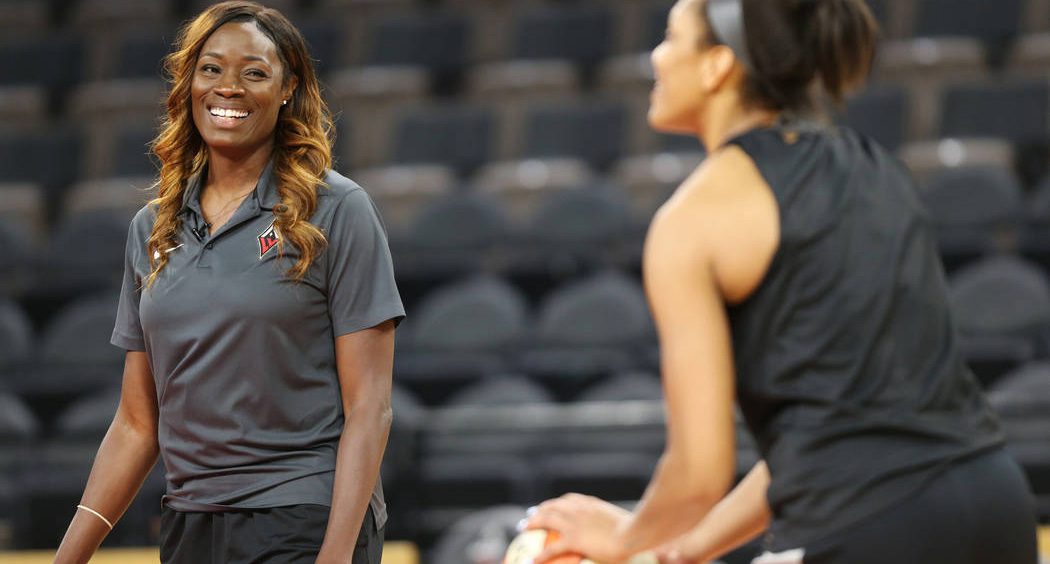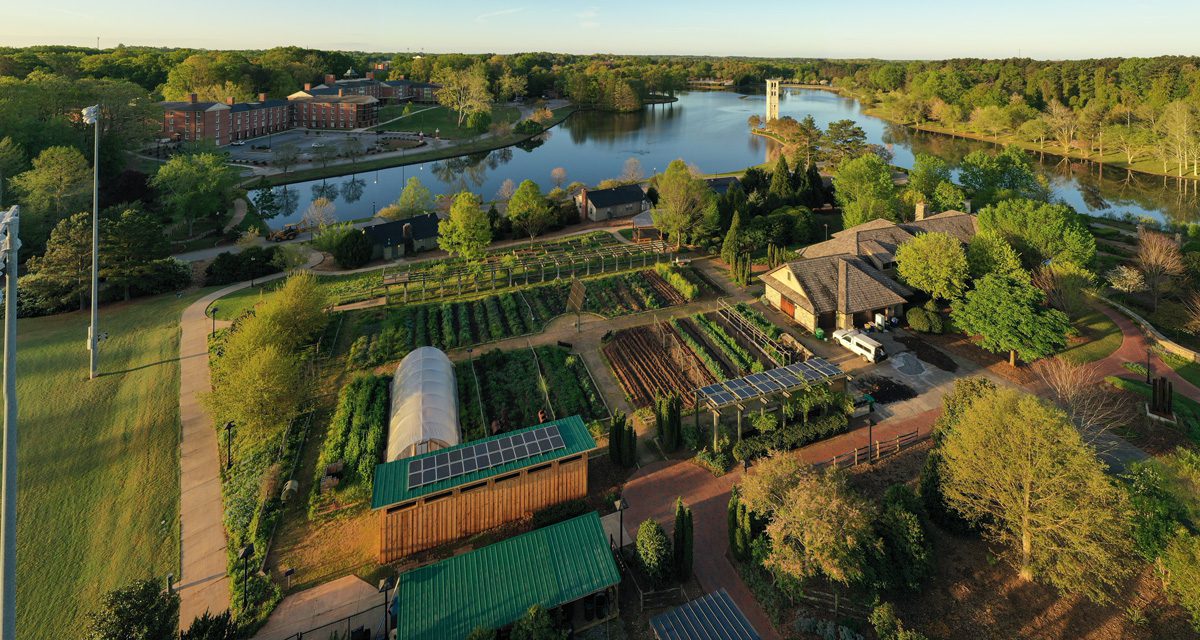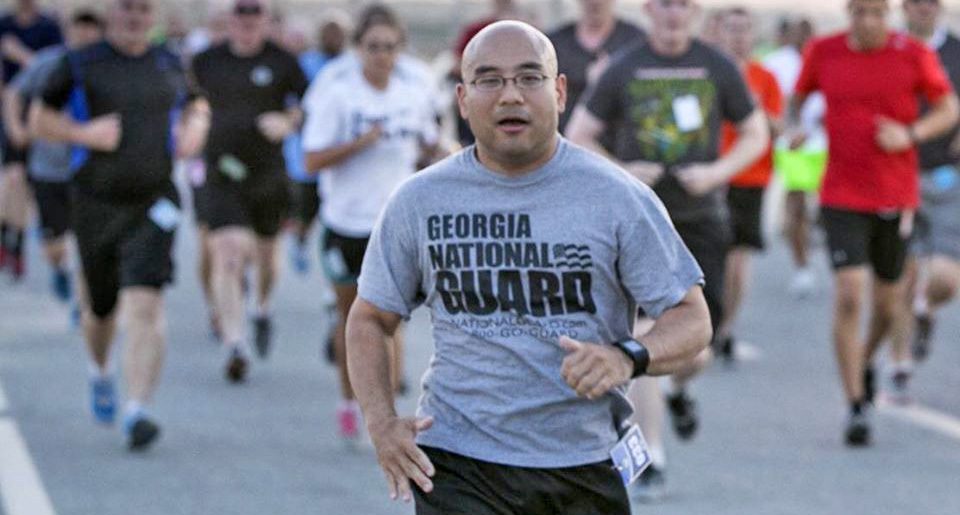
Feature
Gather ’Round -
These Bricks Have a Story
Drew Parker ’00 helped bring The Commons to life. It hasn’t been easy, and he’s not done.
By Cindy Landrum
There’s an old saying, “I wish I knew then what I know now.” For Drew Parker ’00, one of three partners developing The Commons, it’s better that he didn’t.
The food hall and business cluster, which sits on the banks of the Reedy River and along the Swamp Rabbit Trail in Greenville, South Carolina, has transformed a row of abandoned warehouses into a space where local businesses and restaurants grow and community gathers. But when Parker and his partners purchased the buildings in 2015, he had no idea of the obstacles they would face to turn their vision into reality.
“Had I known what we ended up going through, and had I had more experience, I probably would not have kept going,” says Parker. “But you get to a point where there’s no turning back, and you’ve got to go forward. It has been 100 percent worth it, so sometimes not knowing something is the best thing.”
Little did Parker and his business partners know when they bought the warehouses on Welborn Street west of downtown, the city was working on plans to tear the structures down to make way for Unity Park. The city’s new 60-acre signature park will open in October 2021.
Parker and his partners had to work with the state officials on plans to clean up contamination on the site, and with the federal emergency agency because the land was in a floodway. Then the nonprofit Feed and Seed, whose partnership Parker says was “almost the backbone of the project,” had to drop out because of funding shortfalls, severely setting The Commons back.

Parker (center) and members of The Parker Group meet on site at their offices located at The Commons/Rioin Oshiro.
“They were our conduit to getting fresh food to the surrounding Southernside neighborhood, a recognized food desert. That was going to be a big part of the project,” says Parker. “When it didn’t work out, that was a huge blow to us. We had to go back to the drawing board when that unraveled and re-plan, re-engineer and find new tenant partners.”
Parker and his partners, Outdoor Sports Marketing co-owner and president Rion Smith and Ridgeline Construction co-owner Ray Foral, moved their offices to The Commons. They signed up other businesses, from those peddling web design to custom denim to cycling gear, to join them – Billiam, Carolina Triathlon, X-Agency, Yield, GruffyGoat, Photoelectric and Project Plus. In November of 2019, The Commons Market opened with Golden Brown & Delicious, Methodical Coffee, the Bake Room, Automatic Taco, and Community Tap Trailside. The news coming in was good: Some of the restaurants had their best-ever January.
Construction of Unity Park started. The team knew it would affect parking and traffic and had a plan to deal with it.
Then the COVID-19 pandemic hit.
“It’s been a challenge,” says Parker. A statewide order closed dining rooms in March, limiting restaurants to take-out and curbside pickup orders. In May, restaurant patrons were allowed to dine in outdoor spaces before the state allowed restaurants to fully reopen about a week later.

GB&D/Photo: Rio Oshiro
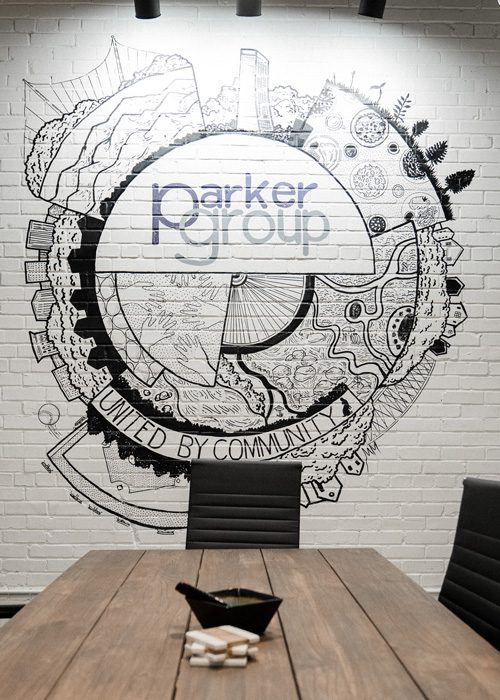
The Parker Group’s Conference Room/Photo: Zach Suggs
From skeptic to partner
Making adjustments is nothing new to Parker. While at Furman, he thought he would play professional tennis after graduation.
“During my sophomore year, I realized I had better buckle down and study because I would need a degree – that I wasn’t going to make it as a professional tennis player,” says Parker, who played for the Paladins from 1997 to 2000 and made the All-Southern Conference tennis team in 2000 for doubles.
He picked communication studies as a major because it didn’t have labs that would interfere with tennis practice. “I didn’t even know what it was when I decided to major in it,” says Parker, a part of the department’s first graduating class.
“It taught me a lot about how to connect with people and how to handle tough situations,” he says. “Not a day goes by without some challenge, whether it’s negotiating or dealing with a government entity.”
Parker wanted to stay in Greenville after graduation to be near his then-girlfriend, now-wife Annie Wood ’01. When he asked former Furman tennis coach Paul Scarpa for suggestions, he was told to take a real estate class. A week later, Parker enrolled in the Greenville-based Wyatt Institute of Real Estate.
After earning his real estate license, he worked for a broker within commuting distance and then went to work with Coldwell Banker Commercial. After seven years, Parker started his own commercial real estate firm, The Parker Group.
Then the recession hit, bringing commercial real estate investment to a halt.
“It has been 100 percent worth it, so sometimes not knowing something is the best thing.”
“The only thing that was moving then was residential, primarily first-time homebuyers,” he says.
After selling houses for seven years, Parker decided he wanted to create the products for those buyers. He started doing urban infill development – building on the urban grid instead of expanding the grid – with a townhouse project called West Park & Townes.
Greenville Mayor Knox White remembers it was troubling when Parker and his partners bought the old warehouse buildings before the city could do so in order to demolish them. But today, White says he has never known a more visionary and talented group than Parker and his partners.
“We moved from concern and skepticism to being big believers in their vision as a complement to the park. It’s been a close partnership ever since,” White says. “The Commons provides a glimpse of how great Unity Park will be.”
Two warehouses to go
Parker always saw something more in the industrial relics left empty along the river. Over the decades, the buildings housed the Greenco Beverage Distributing Co. and Kash n’ Karry.
“They were abandoned warehouses that, to me, were just calling out and saying, ‘Hey, figure out what to do with me,’” he says. “I just needed an excuse to jump in and develop it.”
The property had once caught others’ eye. Moviemakers, that is, more than 10 years ago. “Leatherheads” viewers might glimpse something familiar at The Commons.
“A small portion of the movie was filmed at the end of the buildings in the field,” says Parker, adding that there is still a mural there that advertises the hotel from the movie.
“It’s funny because it says Duluth, Minnesota,” he says. “People have asked me if they moved the building to Greenville from Duluth – I have to break it to them that, no, they did not move a 10,000-square-foot solid brick warehouse from Duluth to Greenville!”
Parker and his partners convinced the city that the warehouses and The Commons could be an integral part of the park’s success. Meanwhile, Cullen Mann ’08 worked for one of Parker’s partners, Rion Smith, and served as an unofficial sounding board and lover of Greenville when The Commons was still just an idea.
Mann was struck by the complexity of what was underway.
“To bring all the entities together is nothing short of miraculous,” he says. “To navigate all the politics, requirements, regulations and funding, and to make something happen with all of those constraints and barriers was impressive.”
But not surprising. Mann first met Parker at a 5:30 a.m. running group at the Caine Halter YMCA. He learned that Parker once did two Ironman triathlons in three days to raise money for the Frazee Dream Center, which provides after-school programs for kids in need.
Mann took note of Parker’s commitment.
“If a guy can put himself through that level of training for something he’s passionate about, he will overcome challenges,” he says. “When he sets his mind to something, he will find a way to get it to the finish line.”
The finish line for The Commons is still a ways away.
They’re planning to buy two additional warehouses on the site, bringing the project close to 100,000 square feet, and hope to add more food options and incorporate nonprofit and outreach programs into the mix.
“The goal is to create a wonderful place to gather,” says Parker.
